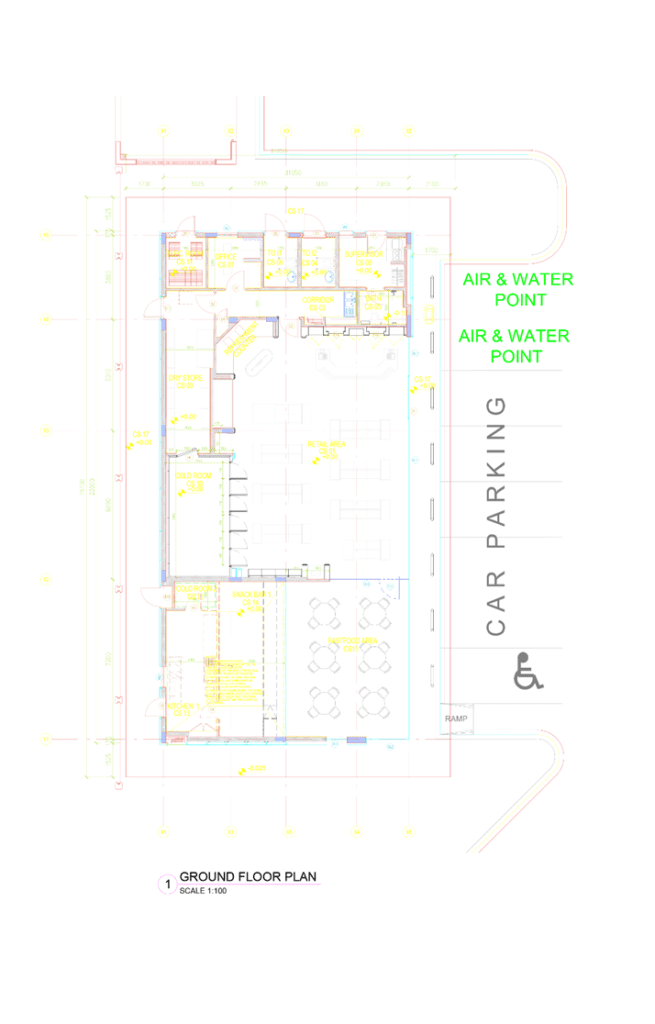Al Marfa Oil and Gas petrol station complex project is the forty-nine article on architecture projects from practice. This project is a one of series of similar projects in the capital of the UAE and all its regions. The mother of the distribution company is Adnoc Petroleum Company, and the distributor is Adnoc Distribution Company. This project is located on the east side of the capital in the Al Marfa region facing the Arab gulf seaside. The developer, the mother company, put together a group of typical buildings on a small scale in the petrol station design. The consultant in charge of handling the MEP design and the architecture and road network design as well as the structure design in one contract Called EPC (engineering, procurement, contracting). The buildings are of one-story height excluding the petrol station canopy which is higher due to the requirement of its function. See Figure 1, a site view from Google showing the open space and building layout of the petrol station in the Al Marfa region.

The buildings are of typical layout in terms of form for all the petrol stations including the Mosque building. The color of the buildings and the logo are typical in all the stations in the capital to make it unique and in harmony. See Figure 2, the station site photo.

Figure 3 shows the site plan of the petrol station with all its components. The relationship between all the small-scale buildings in terms of architectural function and movement is due to the complexity of the mixed movement of automobiles and the human movement of service people and customers. The site plan shows the connection of the new road design connecting the petrol station site to the main highway road network.

The mosque in each petrol station of this kind includes all the services required for men and women, abolition, and the main gent’s prayer hall of 150-200 people. The mosque building is of simple architecture and a story building see Figures 4, and 5 the ground floor plan and elevation of the mosque building.


One of the main components of the petrol station is the island canopy dispensers of the standard architecture function and form design. That includes the color and logo-type canopy. See Figure 6 the island canopy dispensers layout plan.

Due to the petrol station’s location away from residential areas, most petrol stations in open areas in between regions include an accommodation building for staff. The building is of typical two single bed rooms and main services for all including main kitchen and living area. See Figure 7 the ground floor plan of the accommodation building.

The other main component of the petrol station in all the stations built in the capital is the C-store building (retail store) of typical architectural layout. The building includes all the services for customers and the staff, including the retail store with a serving area of snacks and drinks, and also a fast food or small restaurant chain brand like KFC or others. See Figure 8, the ground floor plan of the C-store building.

Most of the built stations have an LPG store in a safe area within the station layout and site plan. It is a small rectangular room storing the LPG material according to the country safety code. See Figure 9, LPG store building in Al Marfa petrol station.

The main services building that is typical in all stations but differs in size due to the size of the station and components is the utility building. The utility building includes the transformer room, the LV room, the mechanical room, and a general store. These components differ in size relative to the electrical load and mechanical load requirements. See Figure 10, the ground floor layout of the utility building in Al Marfa petrol station.

This is one of many stations that were under my management when they were handled by a team of senior architects. I was the design manager responsible for the design management and I had direct contact with the client through occasional meetings. This type of project needed a lot of coordination and management due to its condensed requirements of electromechanical design and safety requirements of the local authorities.
Be First to Comment